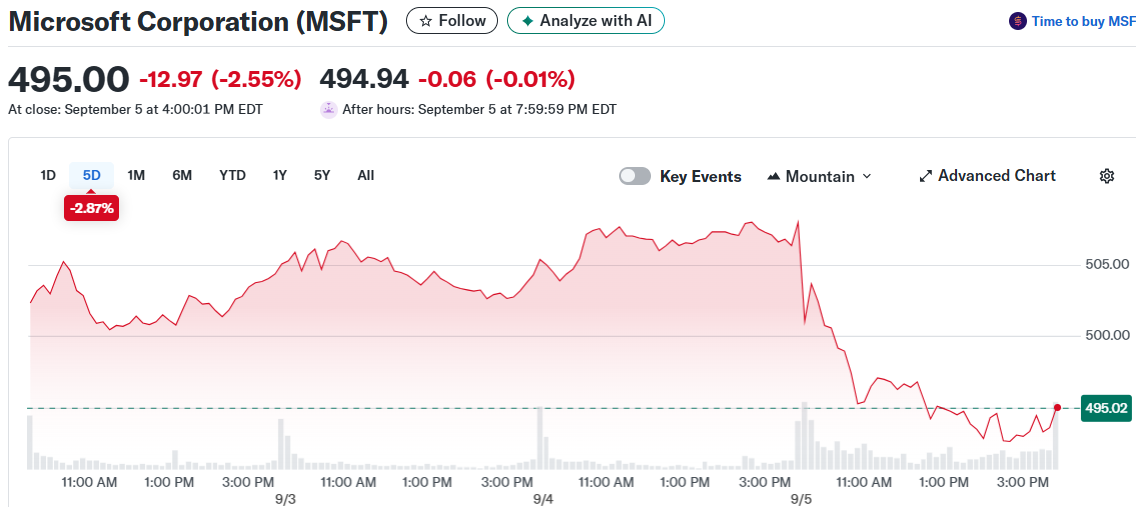Microsoft Stock: Red Sea Cable Disaster Leaves Azure Users With Slower Connections

Image Source: Pixabay
Microsoft faces service disruptions across its Azure cloud platform after undersea fiber cables in the Red Sea were severed. The incident has left users dealing with slower internet speeds and higher latency issues.
The company confirmed that multiple fiber cuts occurred in the Red Sea region. These cables carry internet traffic between continents and are critical for global communications.
🚨🇺🇸🇾🇪 BREAKING: Microsoft reports that MULTIPLE INTERNATIONAL SUBSEA CABLES have been CUT in the RED SEA
— Jackson Hinkle 🇺🇸 (@jacksonhinklle) September 6, 2025
Yemen's ANSAR ALLAH previously warned they would do this if ILLEGAL BOMBINGS continued pic.twitter.com/IQsuq49dD3
Microsoft stated that up to 17% of worldwide internet traffic was affected by the damage. The disruption hit customers in Asia, Europe, and the Middle East the hardest.
Azure users in these regions experienced slower connection speeds. Many also dealt with increased latency when accessing cloud services.
The tech giant initially warned customers to expect degraded performance. Microsoft engineers worked quickly to address the most pressing problems.
The company has since rerouted network traffic through alternative pathways. This helped maintain service availability despite the damaged infrastructure.
Microsoft confirmed that Azure systems returned to stable operation after the rerouting. However, the company warned that full performance may not return until repairs are completed.
Damaged Cables Present Repair Challenges
The severed cables include SEACOM/TGN-EA, AAE-1, and EIG systems. These underwater links connect Europe, Asia, and Africa through the Red Sea corridor.
BREAKING:
— Mega Geopolitics (@MegaGeopolitics) September 6, 2025
Multiple international subsea cables were cut in the Red Sea, impacting the Azure Cloud platform - Microsoft pic.twitter.com/bYuxWrRG5S
Microsoft did not provide details about what caused the cable cuts. Past incidents have involved ship anchors dragging across the seafloor or deliberate sabotage attempts.
The repair process faces additional complications due to regional security issues. Houthi forces in Yemen have been attacking commercial vessels in the Red Sea shipping lanes.
This ongoing conflict creates safety risks for repair ships that need to access the damaged cables. The situation could delay restoration work for extended periods.
Internet monitoring services across the Middle East and South Asia have recorded slower connection speeds. Telecom operators in these regions continue dealing with reduced capacity.
Stock Performance and Analyst Outlook
MSFT shares dropped 2.55% on Friday to close at $495 per share. The decline came as news of the Azure disruptions spread through financial markets.
(Click on image to enlarge)

Microsoft Corporation (MSFT)
Despite the recent service issues, Wall Street analysts maintain bullish views on Microsoft stock. The company holds a Strong Buy consensus rating from research firms.
The average price target for MSFT stands at $627.67 per share. This represents potential upside of 26.80% from current trading levels.
(Click on image to enlarge)

Source: Tipranks
Microsoft continues monitoring network flows daily to minimize customer impact. The company provides regular updates on restoration progress through its Azure status page.
Cloud users and telecom operators across multiple countries may face continued delays until cable repairs are finished.
More By This Author:
XRP Price Prediction: Could ETF Approval Trigger Massive Rally? Analysts Weigh InMARA Holdings Stock: Mining Giant’s Bitcoin Reserves Surge To $5.9 Billion
Strategy Inc. Challenges Wall Street With Bold Bid For S&P 500 Inclusion



